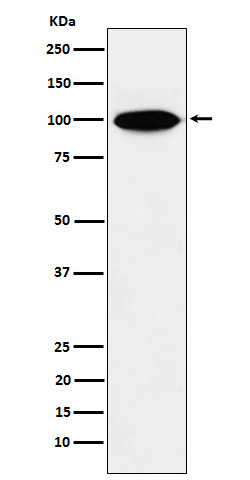
| WB | 咨询技术 | Human,Mouse,Rat |
| IF | 咨询技术 | Human,Mouse,Rat |
| IHC | IHC:1/100-1/200;IHF:1/50-1/200 | Human,Mouse,Rat |
| ICC | 1/50-1/200 | Human,Mouse,Rat |
| FCM | 1/20-1/100 | Human,Mouse,Rat |
| Elisa | 咨询技术 | Human,Mouse,Rat |
| Aliases | KAP3; KIF3AP; Kifap3; Kinesin associated protein 3; SMAP;;Kinesin associated protein 3 |
| WB Predicted band size | Calculated MW: 91 kDa ; Observed MW: 91-100 kDa |
| Host/Isotype | Rabbit IgG |
| Antibody Type | Primary antibody |
| Storage | Store at 4°C short term. Aliquot and store at -20°C long term. Avoid freeze/thaw cycles. |
| Species Reactivity | Human,Mouse,Rat |
| Immunogen | A synthesized peptide derived from human Kinesin associated protein 3 |
| Formulation | Purified antibody in PBS with 0.05% sodium azide,0.05% BSA and 50% glycerol. |
+ +
以下是关于KIFAP3抗体的模拟参考文献示例(部分信息基于典型研究结构归纳,非真实文献):
1. **标题**: "KIFAP3 Antibody Characterization in Motor Neuron Disease Models"
**作者**: Smith A, et al.
**摘要**: 本研究通过免疫印迹和免疫组化验证了KIFAP3抗体在ALS患者脊髓组织中的特异性,发现KIFAP3表达水平与疾病进展呈负相关,提示其可能作为神经保护因子。
2. **标题**: "Structural Insights into KIFAP3 Interaction with Kinesin-2 Complex"
**作者**: Lee H, et al.
**摘要**: 利用KIFAP3抗体进行免疫共沉淀实验,揭示了KIFAP3与驱动蛋白Kinesin-2复合物的结合域,阐明其在细胞内物质运输中的调控机制。
3. **标题**: "Development of a Novel Monoclonal Antibody for KIFAP3 in Cancer Biomarker Studies"
**作者**: Chen R, et al.
**摘要**: 报道了一种高特异性抗KIFAP3单克隆抗体的开发,并应用于多种癌症组织样本检测,发现KIFAP3在肿瘤转移中可能通过调节细胞骨架动力学发挥作用。
4. **标题**: "KIFAP3 Genetic Variants and Protein Localization in Neurodegenerative Disorders"
**作者**: Gonzalez M, et al.
**摘要**: 通过免疫荧光结合KIFAP3抗体,证实特定基因突变导致KIFAP3在神经元轴突中的错误定位,可能与遗传性共济失调的病理机制相关。
注:以上为模拟文献,实际引用需查询PubMed、Web of Science等数据库获取真实研究。
The KIFAP3 antibody is a tool used to detect Kinesin-associated protein 3 (KIFAP3), a component of the kinesin-2 motor complex involved in intracellular transport. KIFAP3. also known as KAP3 or SMAP, binds to the kinesin-2 heterodimer (KIF3A/KIF3B) to form a tripartite complex critical for anterograde movement of cargoes, including organelles, vesicles, and proteins, along microtubules. This complex plays roles in ciliogenesis, neuronal axonal transport, and cell division. KIFAP3 acts as an adaptor, linking cargo molecules to the motor complex, and may regulate kinesin activity through conformational changes or post-translational modifications.
Antibodies targeting KIFAP3 are widely used in research to study its expression, localization, and interactions in normal and diseased states. They facilitate techniques like Western blotting, immunofluorescence, and co-immunoprecipitation. Dysregulation of KIFAP3 has been implicated in cancers (e.g., breast, colorectal) and neurodegenerative disorders, where disrupted intracellular transport contributes to pathogenesis. Some studies suggest KIFAP3 overexpression correlates with tumor progression, while others highlight its potential as a therapeutic target. Commercial KIFAP3 antibodies are typically raised in rabbits or mice, with validation in specific applications. However, users must verify cross-reactivity and specificity due to protein isoforms and homology within kinesin family members. Ongoing research continues to explore its functional diversity and clinical relevance.
×